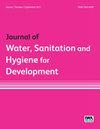应对2019冠状病毒病:加纳通过水和废水管理建设抗灾能力
IF 1.4
4区 环境科学与生态学
Q3 WATER RESOURCES
Journal of Water Sanitation and Hygiene for Development
Pub Date : 2023-09-16
DOI:10.2166/washdev.2023.112
引用次数: 0
摘要
本研究评估了COVID-19对加纳WASH系统的影响。它以低收入家庭和讲卫生部门利益攸关方为重点,以Ayawaso东市为案例研究,记录疫情对讲卫生部门影响的教训。我们使用水和卫生系统方法来了解COVID-19缓解措施对WASH系统的影响。通过调查、涉众参与和文档分析收集数据。我们发现,政府的WASH行动增加了卫生习惯、固体和液体废物的产生以及水的消耗。卫生服务提供者的服务需求减少,客户流失,业务支出增加。这一大流行病的影响是性别的,妇女和女孩承受着更大的负担。我们认为,对这一流行病的应对突出了通过综合循环经济商业模式对卫生废物进行可持续管理的必要性和机会,将废物转化为宝贵的资源。由于其相互关联的性质,在讲卫生系统中应对COVID-19是多部门的,突出了将水和卫生设施以外的部门整合起来的必要性。这需要完善制度结构、政策、投资和专业化服务提供商。本文章由计算机程序翻译,如有差异,请以英文原文为准。
Response to COVID-19: building resilience through water and wastewater management in Ghana
Abstract This study assessed the effects of COVID-19 on Ghana's WASH system. It focused on low-income households and WASH sector stakeholders using Ayawaso East Municipality as a case study to document lessons from the pandemic's impact on the WASH sector. We used the water and sanitation system approach to understand the effects of COVID-19 mitigation measures on the WASH system. Data were collected through surveys, stakeholder engagements, and document analysis. We found that the government's WASH response increased hygiene practices, solid and liquid waste generation, and water consumption. Sanitation service providers experienced reduced demands for their services, lost clients, and increased operational expenditure. The pandemic's impact is gendered, with women and girls experiencing a greater burden. We argue that responses to the pandemic highlight the need and opportunities for sustainable management of sanitation waste through integrated, circular economy business models, turning waste into valuable resources. Responses to COVID-19 in the WASH system are multisectoral because of its interconnected nature, highlighting the need to integrate sectors beyond water and sanitation. This requires improved institutional structures, policies, investment, and professionalising service providers.
求助全文
通过发布文献求助,成功后即可免费获取论文全文。
去求助
来源期刊

Journal of Water Sanitation and Hygiene for Development
WATER RESOURCES-
CiteScore
3.10
自引率
11.80%
发文量
58
审稿时长
16 weeks
期刊介绍:
The Journal of Water, Sanitation and Hygiene for Development is a peer-reviewed journal devoted to the dissemination of high-quality information on the science, policy and practice of drinking-water supply, sanitation and hygiene at local, national and international levels.
 求助内容:
求助内容: 应助结果提醒方式:
应助结果提醒方式:


